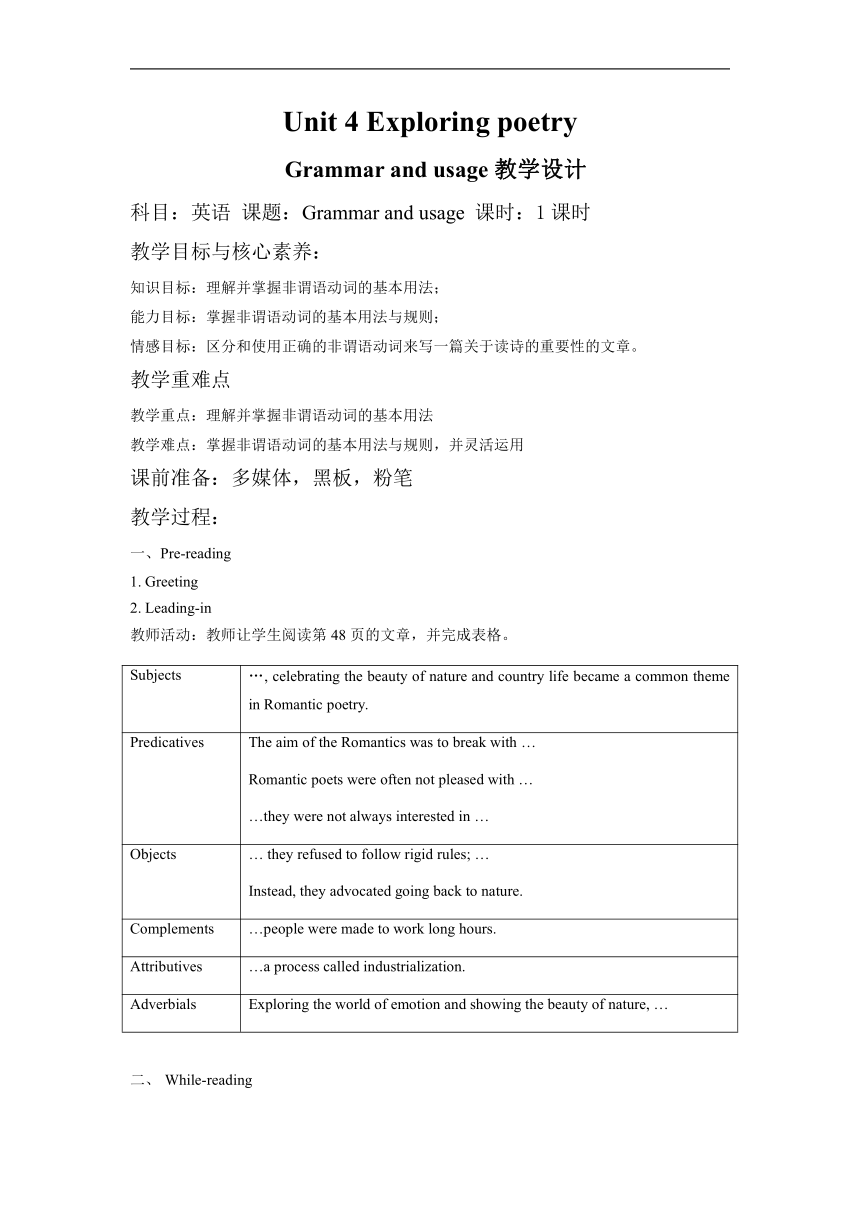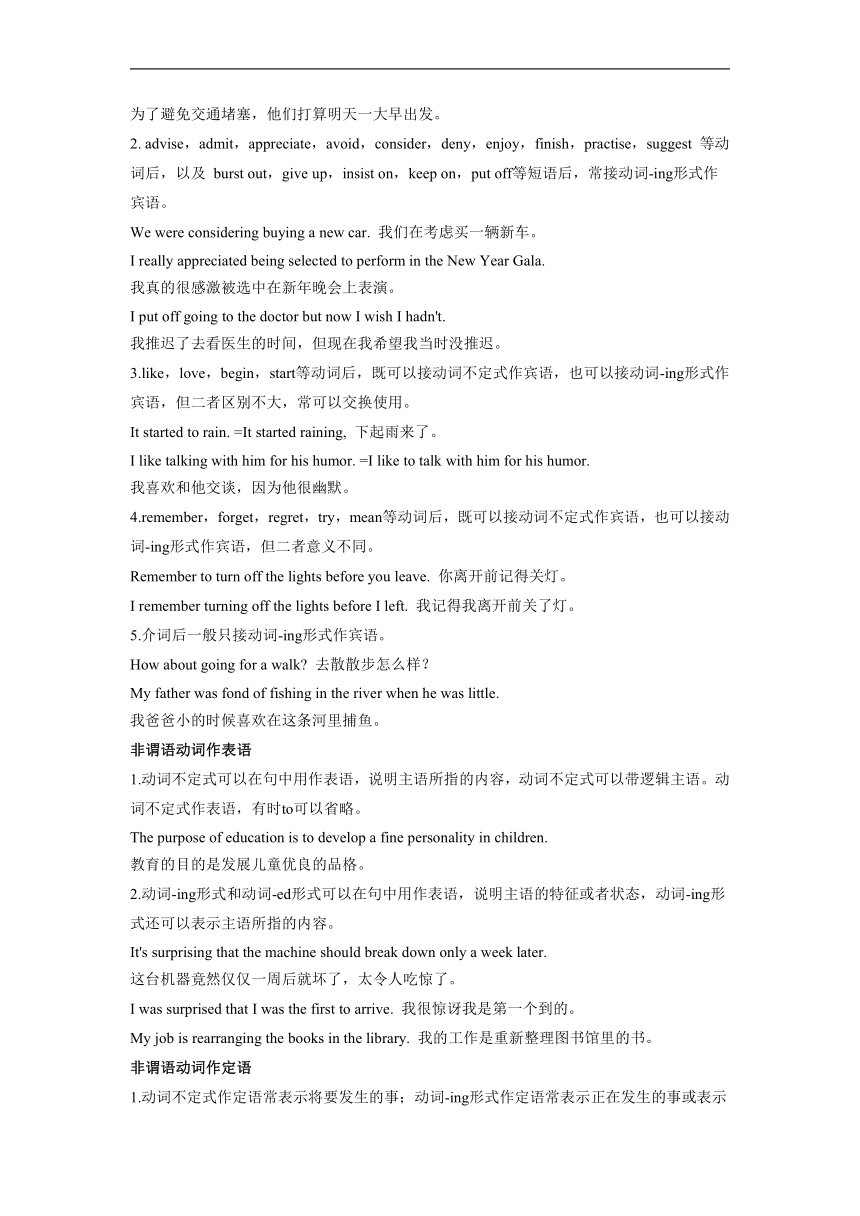牛津译林版(2020)选择性必修第一册 Unit 4 Exploring poetry Section B Grammar and usage 教案
文档属性
| 名称 | 牛津译林版(2020)选择性必修第一册 Unit 4 Exploring poetry Section B Grammar and usage 教案 |

|
|
| 格式 | docx | ||
| 文件大小 | 27.0KB | ||
| 资源类型 | 教案 | ||
| 版本资源 | 牛津译林版(2019) | ||
| 科目 | 英语 | ||
| 更新时间 | 2022-10-11 00:00:00 | ||
图片预览



文档简介
Unit 4 Exploring poetry
Grammar and usage教学设计
科目:英语 课题:Grammar and usage 课时:1课时
教学目标与核心素养:
知识目标:理解并掌握非谓语动词的基本用法;
能力目标:掌握非谓语动词的基本用法与规则;
情感目标:区分和使用正确的非谓语动词来写一篇关于读诗的重要性的文章。
教学重难点
教学重点:理解并掌握非谓语动词的基本用法
教学难点:掌握非谓语动词的基本用法与规则,并灵活运用
课前准备:多媒体,黑板,粉笔
教学过程:
一、Pre-reading
1. Greeting
2. Leading-in
教师活动:教师让学生阅读第48页的文章,并完成表格。
Subjects …, celebrating the beauty of nature and country life became a common theme in Romantic poetry.
Predicatives The aim of the Romantics was to break with … Romantic poets were often not pleased with … …they were not always interested in …
Objects … they refused to follow rigid rules; … Instead, they advocated going back to nature.
Complements …people were made to work long hours.
Attributives …a process called industrialization.
Adverbials Exploring the world of emotion and showing the beauty of nature, …
While-reading
学生活动:在教师的引导下,总结非谓语动词的规则。
非谓语动词常指动词不定式、动词-ing和动词-ed形式,在句中可用作主语、宾语、表语、定语、状语和补语。见下表:
形式 功能
主语 宾语 表语 定语 状语 补语
动词不定式 √ √ √ √ √ √
动词-ing √ √ √ √ √ √
动词-ed √ √ √ √
非谓语动词作主语
动词不定式和动词-ing形式都可以在句中用作主语。
To live is to do something valuable. 活着就是要做一些有价值的事。
Understanding your own needs and styles of communication is as important as learning to convey your preference and emotions.
了解你自己的需要和交流方式与学会表达你的喜好和情感一样重要。
1.动词不定式作主语时,常常用形式主语it代替,不定式置于句末。
常见句型:
It + be +形容词+ (for/of sb.) to do sth.
It + be +名词+to do sth.
It takes sb. some time to do sth.
It's up to sb. to do sth.
It is unwise of you to stay up late every day. 你每天熬夜是不明智的。
It is everyone's duty to obey the law. 遵守法律是每个人的义务。
It took her a month to read the novel. 阅读这部小说花了她一个月的时间。
It is up to us to help those in need. 帮助那些需要帮助的人是我们的责任。
2.动词-ing形式作主语时,有时也可以用形式主语it代替,动词-ing形式置于句末。
常见句型:It is useless/no use/no good/a waste of time/ . . . +动词-ing. . .
It's a waste of time trying to get her to change her mind. 要想让她改变主意是浪费时间。
It's no good complaining-they never listen. 抱怨毫无用处——他们根本不听。
非谓语动词作宾语
动词不定式和动词-ing形式都可以在句中用作宾语。
1. afford,agree,arrange,choose,claim,desire,expect,fail,hope,intend,offer,pretend,promise,refuse,wish 等动词后,常接动词不定式作宾语。
Peter offered to teach them water-skiing. 彼得表示愿意教他们滑水。
They intend to leave early tomorrow morning to avoid traffic jams.
为了避免交通堵塞,他们打算明天一大早出发。
2. advise,admit,appreciate,avoid,consider,deny,enjoy,finish,practise,suggest 等动词后,以及 burst out,give up,insist on,keep on,put off等短语后,常接动词-ing形式作
宾语。
We were considering buying a new car. 我们在考虑买一辆新车。
I really appreciated being selected to perform in the New Year Gala.
我真的很感激被选中在新年晚会上表演。
I put off going to the doctor but now I wish I hadn't.
我推迟了去看医生的时间,但现在我希望我当时没推迟。
3.like,love,begin,start等动词后,既可以接动词不定式作宾语,也可以接动词-ing形式作宾语,但二者区别不大,常可以交换使用。
It started to rain. =It started raining, 下起雨来了。
I like talking with him for his humor. =I like to talk with him for his humor.
我喜欢和他交谈,因为他很幽默。
4.remember,forget,regret,try,mean等动词后,既可以接动词不定式作宾语,也可以接动词-ing形式作宾语,但二者意义不同。
Remember to turn off the lights before you leave. 你离开前记得关灯。
I remember turning off the lights before I left. 我记得我离开前关了灯。
5.介词后一般只接动词-ing形式作宾语。
How about going for a walk 去散散步怎么样?
My father was fond of fishing in the river when he was little.
我爸爸小的时候喜欢在这条河里捕鱼。
非谓语动词作表语
1.动词不定式可以在句中用作表语,说明主语所指的内容,动词不定式可以带逻辑主语。动词不定式作表语,有时to可以省略。
The purpose of education is to develop a fine personality in children.
教育的目的是发展儿童优良的品格。
2.动词-ing形式和动词-ed形式可以在句中用作表语,说明主语的特征或者状态,动词-ing形式还可以表示主语所指的内容。
It's surprising that the machine should break down only a week later.
这台机器竟然仅仅一周后就坏了,太令人吃惊了。
I was surprised that I was the first to arrive. 我很惊讶我是第一个到的。
My job is rearranging the books in the library. 我的工作是重新整理图书馆里的书。
非谓语动词作定语
1.动词不定式作定语常表示将要发生的事;动词-ing形式作定语常表示正在发生的事或表示主动意义;动词-ed形式作定语常表示已经发生的事或表示被动意义。
I have a lot of work to do. 我有许多工作要做。
The girl singing in the next room is his sister. 隔壁房间里正在唱歌的女孩是他的妹妹。
They built a highway leading to the mountains. 他们建了一条通往山区的公路。
Half of the guests invited to the party are his colleagues. 被邀请参加聚会的客人中有一半是他的同事。
These trucks carry goods exported to foreign countries. 这些卡车运送出口货物。
2.动词不定式和动词-ing形式作定语时可以有被动形式。
Are you going to the conference to be held next week
你准备参加下周举行的会议吗?
The man being questioned is the only witness to the accident.
正在接受审问的那个人是事故的唯一目击者。
注意:
(1)the only,the last,the next等以及序数词后常用不定式作定语。
(2)被 the only,the best,the last,the next等或序数词修饰的词后,常用不定式作后置定语。
(3)ability,chance,idea,hope,wish,fact,excuse,promise,attempt,way等抽象名词后常用不定式作定语。
China was the first developing country to independently perform a manned space flight.
中国是第一个独立进行载人航天飞行的发展中国家。
I don't think he is the best man to do the job.
我认为他不是做这份工作的最佳人选。
The ability to express an idea is as important as the idea itself.
表达观点的能力与观点本身同等重要。
非谓语动词作状语
1.动词不定式作状语可以表示目的或者结果,动词-ing形式和动词-ed形式作状语可以表示时间、原因、伴随、让步、条件等意义。
We will continue our campaign to prevent and control air pollution to make our sky blue again. 我们将继续我们防治空气污染的运动,以使我们的天空再次变得蔚蓝。
He walked down the hill, singing softly to himself.
他从小山上走下来,自顾自轻声哼着曲儿。
His parents died, leaving him an orphan. 他的父母去世了,他成了孤儿。
Knowing all this, I still want to see it for myself.
尽管知道了一切情况,我还是想亲自去看一看。
Seriously injured, she had to be sent to hospital at once.
她受了重伤,必须立刻送往医院。
Given more time, we would have done the work better.
如果(当时)给予更多的时间,我们会把工作做得更好。
2.动词-ing形式具有主动意义,动词-ed形式具有被动意义。
Turning to the right, you will find a path leading to his cottage.
向右转,你会找到一条通往他的小别墅的小路。
Painted white, the house looks bigger. 漆成白色后,这房子看起来大了些。
3.动词-ing形式作状语可用完成式。
Having been shown around the library, the visitors were taken to the playground.
参观完图书馆后,游客们被带到了操场上。
Not having received the answer, the girl decided to write another email.
由于没有得到答复,这个女孩决定再写一封电子邮件。
非谓语动词作补语
1.allow,expect,forbid,force,order,permit,request,warn等动词后,常接“名词/代词+动词不定式”结构,动词不定式作补语。
Father will not allow us to play in the street. 父亲不会允许我们在街上玩耍。
We warned them not to skate on such thin ice. 我们告诫过他们,不要在这么薄的冰上溜冰。
2.see,hear,notice,watch,feel,let,have等动词后,可以接不带to的动词不定式作补语,表示动作的整个过程;这些动词也可以接动词-ing形式作补语,表示动作正在进行或一直在
进行。
I saw him entering the bank. 我看见他正走进银行。(him与enter之间为逻辑上的主谓关系)
They had the fire burning all night. 他们让火整夜烧着。(burn这一动作一直在进行)
3.动词-ed形式作补语常表示被动意义。
I will have my bike repaired tomorrow. 明天我要让人修一下
我的自行车。(让别人去修)
He was happy to see his mother taken good care of at home.
他很高兴看到母亲在家里受到很好的照顾。(his mother与take之间为逻辑上的动宾关系)
三、After-reading
教师活动:指导学生完成第49页B1。
① Romantic poets were particularly interested in experimenting with new poetic forms.
② Romantic poets often mentioned the effect of beauty on the poet's imagination when describing natural scenes.
③ Poems focusing on nature often stress the moment of inspiration.
④ Filled with descriptions of magic and ancient themes, many Romantic poems contain rich sensory details.
⑤ Since Romantic poets were highly colourful and independent individuals, it is sometimes difficult to find concerns common to all of them.
学生活动:完成第49页B2。
(1) leading (2) Growing (3) Educated (4) touring (5) Meeting (6) written (7) to express (8) to live
四、Summary
归纳总结非谓语动词的用法。
五、作业布置
完成B3活动的写作。
Grammar and usage教学设计
科目:英语 课题:Grammar and usage 课时:1课时
教学目标与核心素养:
知识目标:理解并掌握非谓语动词的基本用法;
能力目标:掌握非谓语动词的基本用法与规则;
情感目标:区分和使用正确的非谓语动词来写一篇关于读诗的重要性的文章。
教学重难点
教学重点:理解并掌握非谓语动词的基本用法
教学难点:掌握非谓语动词的基本用法与规则,并灵活运用
课前准备:多媒体,黑板,粉笔
教学过程:
一、Pre-reading
1. Greeting
2. Leading-in
教师活动:教师让学生阅读第48页的文章,并完成表格。
Subjects …, celebrating the beauty of nature and country life became a common theme in Romantic poetry.
Predicatives The aim of the Romantics was to break with … Romantic poets were often not pleased with … …they were not always interested in …
Objects … they refused to follow rigid rules; … Instead, they advocated going back to nature.
Complements …people were made to work long hours.
Attributives …a process called industrialization.
Adverbials Exploring the world of emotion and showing the beauty of nature, …
While-reading
学生活动:在教师的引导下,总结非谓语动词的规则。
非谓语动词常指动词不定式、动词-ing和动词-ed形式,在句中可用作主语、宾语、表语、定语、状语和补语。见下表:
形式 功能
主语 宾语 表语 定语 状语 补语
动词不定式 √ √ √ √ √ √
动词-ing √ √ √ √ √ √
动词-ed √ √ √ √
非谓语动词作主语
动词不定式和动词-ing形式都可以在句中用作主语。
To live is to do something valuable. 活着就是要做一些有价值的事。
Understanding your own needs and styles of communication is as important as learning to convey your preference and emotions.
了解你自己的需要和交流方式与学会表达你的喜好和情感一样重要。
1.动词不定式作主语时,常常用形式主语it代替,不定式置于句末。
常见句型:
It + be +形容词+ (for/of sb.) to do sth.
It + be +名词+to do sth.
It takes sb. some time to do sth.
It's up to sb. to do sth.
It is unwise of you to stay up late every day. 你每天熬夜是不明智的。
It is everyone's duty to obey the law. 遵守法律是每个人的义务。
It took her a month to read the novel. 阅读这部小说花了她一个月的时间。
It is up to us to help those in need. 帮助那些需要帮助的人是我们的责任。
2.动词-ing形式作主语时,有时也可以用形式主语it代替,动词-ing形式置于句末。
常见句型:It is useless/no use/no good/a waste of time/ . . . +动词-ing. . .
It's a waste of time trying to get her to change her mind. 要想让她改变主意是浪费时间。
It's no good complaining-they never listen. 抱怨毫无用处——他们根本不听。
非谓语动词作宾语
动词不定式和动词-ing形式都可以在句中用作宾语。
1. afford,agree,arrange,choose,claim,desire,expect,fail,hope,intend,offer,pretend,promise,refuse,wish 等动词后,常接动词不定式作宾语。
Peter offered to teach them water-skiing. 彼得表示愿意教他们滑水。
They intend to leave early tomorrow morning to avoid traffic jams.
为了避免交通堵塞,他们打算明天一大早出发。
2. advise,admit,appreciate,avoid,consider,deny,enjoy,finish,practise,suggest 等动词后,以及 burst out,give up,insist on,keep on,put off等短语后,常接动词-ing形式作
宾语。
We were considering buying a new car. 我们在考虑买一辆新车。
I really appreciated being selected to perform in the New Year Gala.
我真的很感激被选中在新年晚会上表演。
I put off going to the doctor but now I wish I hadn't.
我推迟了去看医生的时间,但现在我希望我当时没推迟。
3.like,love,begin,start等动词后,既可以接动词不定式作宾语,也可以接动词-ing形式作宾语,但二者区别不大,常可以交换使用。
It started to rain. =It started raining, 下起雨来了。
I like talking with him for his humor. =I like to talk with him for his humor.
我喜欢和他交谈,因为他很幽默。
4.remember,forget,regret,try,mean等动词后,既可以接动词不定式作宾语,也可以接动词-ing形式作宾语,但二者意义不同。
Remember to turn off the lights before you leave. 你离开前记得关灯。
I remember turning off the lights before I left. 我记得我离开前关了灯。
5.介词后一般只接动词-ing形式作宾语。
How about going for a walk 去散散步怎么样?
My father was fond of fishing in the river when he was little.
我爸爸小的时候喜欢在这条河里捕鱼。
非谓语动词作表语
1.动词不定式可以在句中用作表语,说明主语所指的内容,动词不定式可以带逻辑主语。动词不定式作表语,有时to可以省略。
The purpose of education is to develop a fine personality in children.
教育的目的是发展儿童优良的品格。
2.动词-ing形式和动词-ed形式可以在句中用作表语,说明主语的特征或者状态,动词-ing形式还可以表示主语所指的内容。
It's surprising that the machine should break down only a week later.
这台机器竟然仅仅一周后就坏了,太令人吃惊了。
I was surprised that I was the first to arrive. 我很惊讶我是第一个到的。
My job is rearranging the books in the library. 我的工作是重新整理图书馆里的书。
非谓语动词作定语
1.动词不定式作定语常表示将要发生的事;动词-ing形式作定语常表示正在发生的事或表示主动意义;动词-ed形式作定语常表示已经发生的事或表示被动意义。
I have a lot of work to do. 我有许多工作要做。
The girl singing in the next room is his sister. 隔壁房间里正在唱歌的女孩是他的妹妹。
They built a highway leading to the mountains. 他们建了一条通往山区的公路。
Half of the guests invited to the party are his colleagues. 被邀请参加聚会的客人中有一半是他的同事。
These trucks carry goods exported to foreign countries. 这些卡车运送出口货物。
2.动词不定式和动词-ing形式作定语时可以有被动形式。
Are you going to the conference to be held next week
你准备参加下周举行的会议吗?
The man being questioned is the only witness to the accident.
正在接受审问的那个人是事故的唯一目击者。
注意:
(1)the only,the last,the next等以及序数词后常用不定式作定语。
(2)被 the only,the best,the last,the next等或序数词修饰的词后,常用不定式作后置定语。
(3)ability,chance,idea,hope,wish,fact,excuse,promise,attempt,way等抽象名词后常用不定式作定语。
China was the first developing country to independently perform a manned space flight.
中国是第一个独立进行载人航天飞行的发展中国家。
I don't think he is the best man to do the job.
我认为他不是做这份工作的最佳人选。
The ability to express an idea is as important as the idea itself.
表达观点的能力与观点本身同等重要。
非谓语动词作状语
1.动词不定式作状语可以表示目的或者结果,动词-ing形式和动词-ed形式作状语可以表示时间、原因、伴随、让步、条件等意义。
We will continue our campaign to prevent and control air pollution to make our sky blue again. 我们将继续我们防治空气污染的运动,以使我们的天空再次变得蔚蓝。
He walked down the hill, singing softly to himself.
他从小山上走下来,自顾自轻声哼着曲儿。
His parents died, leaving him an orphan. 他的父母去世了,他成了孤儿。
Knowing all this, I still want to see it for myself.
尽管知道了一切情况,我还是想亲自去看一看。
Seriously injured, she had to be sent to hospital at once.
她受了重伤,必须立刻送往医院。
Given more time, we would have done the work better.
如果(当时)给予更多的时间,我们会把工作做得更好。
2.动词-ing形式具有主动意义,动词-ed形式具有被动意义。
Turning to the right, you will find a path leading to his cottage.
向右转,你会找到一条通往他的小别墅的小路。
Painted white, the house looks bigger. 漆成白色后,这房子看起来大了些。
3.动词-ing形式作状语可用完成式。
Having been shown around the library, the visitors were taken to the playground.
参观完图书馆后,游客们被带到了操场上。
Not having received the answer, the girl decided to write another email.
由于没有得到答复,这个女孩决定再写一封电子邮件。
非谓语动词作补语
1.allow,expect,forbid,force,order,permit,request,warn等动词后,常接“名词/代词+动词不定式”结构,动词不定式作补语。
Father will not allow us to play in the street. 父亲不会允许我们在街上玩耍。
We warned them not to skate on such thin ice. 我们告诫过他们,不要在这么薄的冰上溜冰。
2.see,hear,notice,watch,feel,let,have等动词后,可以接不带to的动词不定式作补语,表示动作的整个过程;这些动词也可以接动词-ing形式作补语,表示动作正在进行或一直在
进行。
I saw him entering the bank. 我看见他正走进银行。(him与enter之间为逻辑上的主谓关系)
They had the fire burning all night. 他们让火整夜烧着。(burn这一动作一直在进行)
3.动词-ed形式作补语常表示被动意义。
I will have my bike repaired tomorrow. 明天我要让人修一下
我的自行车。(让别人去修)
He was happy to see his mother taken good care of at home.
他很高兴看到母亲在家里受到很好的照顾。(his mother与take之间为逻辑上的动宾关系)
三、After-reading
教师活动:指导学生完成第49页B1。
① Romantic poets were particularly interested in experimenting with new poetic forms.
② Romantic poets often mentioned the effect of beauty on the poet's imagination when describing natural scenes.
③ Poems focusing on nature often stress the moment of inspiration.
④ Filled with descriptions of magic and ancient themes, many Romantic poems contain rich sensory details.
⑤ Since Romantic poets were highly colourful and independent individuals, it is sometimes difficult to find concerns common to all of them.
学生活动:完成第49页B2。
(1) leading (2) Growing (3) Educated (4) touring (5) Meeting (6) written (7) to express (8) to live
四、Summary
归纳总结非谓语动词的用法。
五、作业布置
完成B3活动的写作。
同课章节目录
- Unit 1 Food matters
- Welcome to the unit
- Reading
- Grammar and usage
- Integrated skills
- Extended reading
- Project
- Unit 2 The Universal Language
- Welcome to the unit
- Reading
- Grammar and usage
- Integrated skills
- Extended reading
- Project
- Unit 3 The art of painting
- Welcome to the unit
- Reading
- Grammar and usage
- Integrated skills
- Extended reading
- Project
- Unit 4 Exploring poetry
- Welcome to the unit
- Reading
- Grammar and usage
- Integrated skills
- Extended reading
- Project
